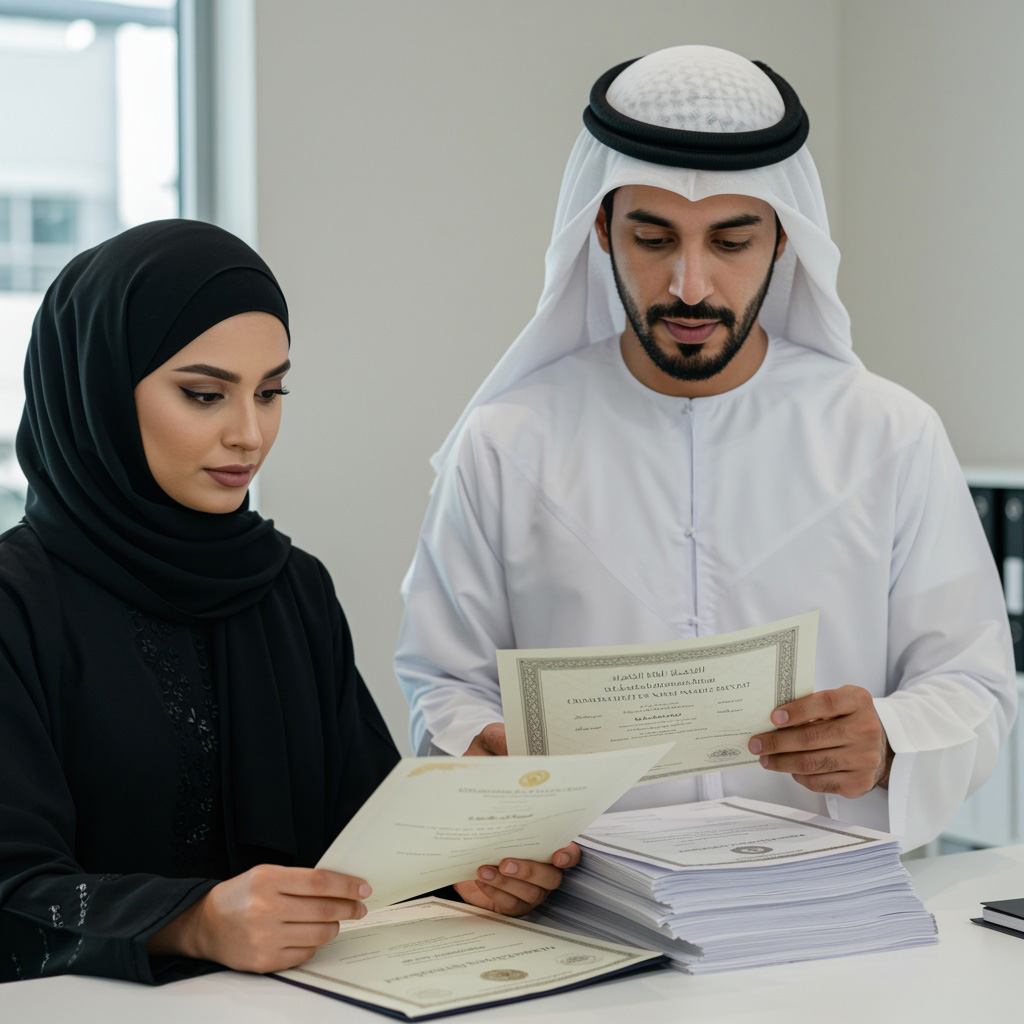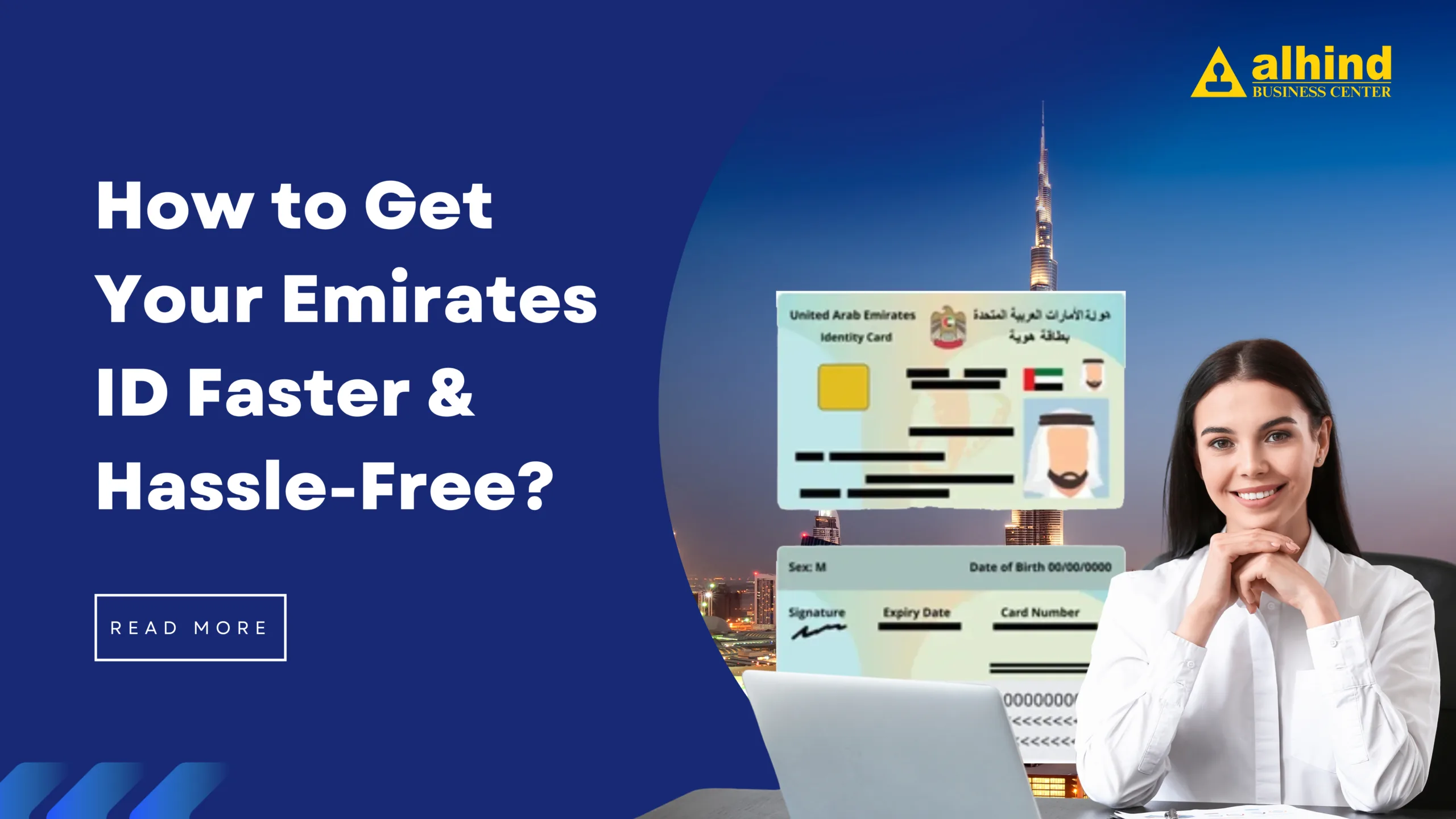Table of Contents
Dubai’s food and beverage (F&B) industry is booming, experiencing an impressive growth rate of 15% in early 2025. This rapid expansion is fueled by a vibrant mix of rising tourism, a diverse and multicultural population, and strong government support, all of which make Dubai an attractive destination for restaurant entrepreneurs. As one of the world’s top gastronomy capitals, Dubai offers vast opportunities for restaurateurs to tap into a dynamic market with high demand for international cuisines, innovative dining experiences, and quality food offerings.
For any entrepreneur looking to start a restaurant business in Dubai, understanding the legal landscape, cost factors, and regulatory requirements is critical for success. With a complex licensing system and stringent food safety standards, it can be challenging for new entrants to navigate the process without expert guidance. At Alhind Business Center, we specialize in helping you streamline your restaurant setup journey from securing the right licenses to managing compliance matters to ensure a smooth launch in this thriving F&B ecosystem.
Disclaimer: This blog provides general information about starting a restaurant business in Dubai. It is not a substitute for legal or professional advice. Regulations and requirements may change and can vary depending on your specific business circumstances.
Understanding the Restaurant Business Setup in Dubai
Starting a restaurant in Dubai requires a clear understanding of the different business setup options available and the popular types of restaurant models that thrive in the city. From selecting the right jurisdiction to choosing a restaurant concept that aligns with market demand, these factors significantly impact your success. Let’s explore the key setup choices and the restaurant types seen around Dubai.
Mainland vs Freezone for Restaurant Setup
When setting up a restaurant business in Dubai, choosing between the Mainland and Freezone jurisdictions is a crucial decision.
- Key Differences: Mainland companies can operate anywhere in Dubai and throughout the UAE without restrictions, allowing for direct business with the local market and government entities. They require leasing physical office or commercial space and may need a local sponsor, depending on the activity. Freezone companies offer 100% foreign ownership, simplified setup, and tax benefits, but are limited to operating within the Freezone or internationally. Trading or serving customers in the mainland UAE typically requires appointing a local distributor.
- Which is Better for Restaurants? For restaurants targeting the local population and tourists inside Dubai, the Mainland setup is generally preferred because it allows starting a food and beverage business with fewer operational limitations. Some specialized Freezones may offer F&B licenses, but Mainland licensing aligns better with on-ground restaurant operations.
For a detailed comparison of business setups in Dubai, you can also read our previous blog “Mainland vs Free Zone vs Offshore: Choosing the Right Business Setup in Dubai.”
Popular Restaurant Types in Dubai
Dubai’s diverse and cosmopolitan population supports a wide variety of restaurant formats. Key types include:
- Cafés & Coffee Shops: These casual and quick-service spots cater to the busy lifestyles of residents and tourists with coffee, light meals, and snacks.
- Fine Dining Restaurants: Offering luxurious ambiance and gourmet menus, fine dining attracts both high-end clientele and international visitors looking for premium culinary experiences.
- Quick Service / Fast Food: The fast-paced environment in Dubai fuels demand for quick-serve and fast food options, which cover both international chains and local favorites.
- Cloud Kitchens / Delivery-Based Restaurants: Fuelled by the rising trend in online food delivery, cloud kitchens operate without dine-in facilities and focus solely on delivery, reducing overhead costs while reaching a broad audience.
Step-by-Step Process to Open a Restaurant in Dubai
Opening a restaurant in Dubai involves a series of well-defined legal and operational steps to ensure compliance with local laws and a smooth launch. Understanding each stage carefully will help aspiring restaurateurs avoid delays and costly mistakes.
1. Choose Your Business Structure
Decide the legal form of your restaurant business, such as a sole proprietorship, Limited Liability Company (LLC), branch office, or other structures. For most restaurant setups, an LLC is common since it allows trading directly with the local market and provides limited liability protection. Your choice impacts ownership, liability, and licensing requirements.
2. Select a Strategic Location
Choosing the right location is critical for your restaurant’s success. High-footfall areas such as shopping malls, tourist hotspots, and business districts can drive greater customer traffic but often come with higher rents. Niche or community-focused locations may offer lower costs and loyal clientele but require targeted marketing and quality service to thrive.
3. Reserve a Trade Name
Registering a unique trade name is essential and must comply with Dubai’s naming conventions. The name should be distinctive, culturally appropriate, and not violate any trademarks or government authority names. Trade name reservation is done through the Department of Economic Development (DED) or the Freezone Authority.
4. Apply for Initial Approval from DED (Mainland) or Free Zone Authority
Once your trade name is approved, you apply for initial approval, a no-objection certificate that allows you to proceed with leasing commercial space and applying for the trade license specific to your business activities. This approval confirms official acceptance of your intended restaurant business.
5. Get a Food & Trade License
The trade license is obtained from the DED (for mainland businesses), permitting you to operate your restaurant legally. Additionally, a food license issued by the Dubai Municipality’s Food Safety Department is mandatory, ensuring your kitchen and food handling areas meet stringent hygiene and safety standards.
6. Secure Additional Approvals (if applicable)
Depending on your restaurant concept, you may require other permits such as:
- Alcohol license for serving beverages,
- Registration with delivery platforms for online food orders,
- Specialty permits for handling pork or shisha, for example.
7. Sign the Tenancy Contract & Obtain Ejari
Rent a suitable location and sign a tenancy contract. The contract must be registered through Ejari, Dubai’s official rental contract registration system. Ejari registration is mandatory for trade license applications and ensures your property lease complies with government regulations.
8. Hire Staff & Complete Labor Approvals
Recruiting staff requires processing work permits, labor cards, and residency visas in line with UAE labor laws. Compliance with staffing regulations includes ensuring legal employment contracts, health insurance, and labor law to avoid penalties and protect your workforce.
Restaurant License Types in Dubai
When starting a restaurant business in Dubai, obtaining the correct license is essential to operate legally and meet all regulatory requirements. There are several types of licenses available depending on the nature and setup of your restaurant:
- Professional License: This license is suitable for restaurants and coffee shops that prepare and serve food and beverages inside their premises. It covers activities such as offering snacks, meals, and liquid refreshments for immediate consumption by the public. Professional licenses allow 100% foreign ownership with a local service agent and are ideal for standalone restaurants and cafés.
- Commercial License: This license type applies to activities involving commercial trade, including tourism-related services. It covers establishments such as floating restaurants (on boats or yachts), mini stores combined with restaurants, and multi-restaurant centers. A commercial license allows for a broader scope of business activities, including selling some consumer goods alongside food service.
- Tourism License: Certain restaurant setups, especially those linked to tourism services like cruise ships or tourist camps, require a tourism license. This license ensures compliance with Dubai’s Department of Tourism and Commerce Marketing (DTCM) standards and is mandatory for restaurants operating within the tourism sector.
- Special Food Truck or Kiosk Licenses: For mobile food businesses such as food trucks or kiosks, specialized licenses are required that reflect the unique operational and health standards applicable to these types of food outlets.
At Alhind Business Center, we specialize in guiding you through the licensing process, from selecting the most suitable license type for your restaurant concept to preparing all necessary documentation and securing approvals from Dubai authorities. Our expert assistance ensures a hassle-free and timely setup so you can focus on growing your restaurant business.
Costs Involved in Starting a Restaurant in Dubai
Starting a restaurant in Dubai requires careful financial planning to cover various essential costs. Understanding these expenses upfront helps avoid surprises and ensures a smooth business launch.
1. Trade License Costs
Trade license fees in Dubai for restaurants typically range between AED 10,000 and AED 25,000, depending on the jurisdiction and business activity. Additional food safety licenses and permits from Dubai Municipality are also required, generally costing AED 8,000 to AED 15,000.
2. Location Rent & Fit-Out Expenses
Location choice greatly impacts costs. Rent for prime spots in popular areas can be substantial, from AED 10,000 to AED 50,000 per month, depending on size and foot traffic. Fit-out expenses for kitchen setup, interior design, and décor can range from AED 150,000 to over AED 500,000 based on the restaurant’s scale and concept.
3. Staff Hiring & Visa Costs
Hiring qualified staff involves expenses for salaries and visa processing, including work permits and Emirates IDs. These costs usually range from AED 25,000 to AED 70,000 initially, depending on team size.
4. Food Safety Approvals & Inspections Fees
To comply with health and safety regulations, Dubai Municipality charges fees for food safety inspections and approvals, typically between AED 8,000 and AED 15,000. Ensuring compliance is critical to legally operating your restaurant.
5. Marketing & Launch Budget
Effective marketing and promotional campaigns are necessary for a successful launch. Budgets vary widely but typically range from AED 10,000 to AED 50,000 to cover advertising, social media campaigns, and launch events.
6. Average Cost Range Breakdown (Small, Medium, High-end Restaurants)
- Small and Delivery-only Kitchens: Around AED 200,000 to AED 400,000 startup cost.
- Medium-sized Casual Dining: AED 400,000 to AED 800,000 depending on location and décor.
- High-end Fine Dining: AED 1,000,000+ for luxury interiors, prime locations, and full service.
At Alhind Business Center, we provide expert assistance in navigating the entire licensing process, rental agreements, and regulatory approvals. Our team helps streamline your restaurant setup, ensuring compliance with all legal and financial requirements, so you can focus on building a successful business.
Legal & Regulatory Requirements
Launching a restaurant in Dubai requires strict adherence to several legal and regulatory standards designed to protect public health and ensure high-quality food service. Compliance with these requirements is essential to operate legally and build customer trust.
Food Safety Requirements
Dubai enforces stringent food safety measures aligned with international standards such as HACCP (Hazard Analysis Critical Control Point) certification. HACCP helps identify and control potential hazards in food production and handling processes to ensure food safety. Furthermore, Dubai Municipality regularly conducts inspections to verify that restaurants comply with hygiene, food preparation, and storage regulations. Obtaining a food safety certificate from the municipality is mandatory to legally operate a food outlet.
Health & Hygiene Regulations
Staff working in food establishments must undergo medical fitness tests and maintain valid health cards, which certify they are free from contagious diseases. This ensures all food handlers follow hygiene best practices, thereby minimizing risks of contamination and foodborne illnesses. Compliance with these health checks and hygiene regulations is supervised by the Dubai health authorities and is strictly enforced.
Business Compliance & Renewals
Restaurant owners must renew their trade licenses annually by submitting the required documentation and paying renewal fees. Additionally, if your restaurant’s annual revenue exceeds the mandatory threshold, VAT registration with the Federal Tax Authority becomes necessary to comply with UAE tax laws. Regular compliance with all operational permits and licenses, including health and safety certificates, helps avoid fines or business interruptions.
At Alhind Business Center, we assist you in navigating all these legal and regulatory requirements, from obtaining HACCP certification and municipal approvals to managing annual license renewals and VAT registration. Our support ensures your restaurant complies fully with Dubai’s regulations, allowing you to focus on successful business growth.
Common Challenges & How to Overcome Them
Starting and managing a restaurant in Dubai comes with several challenges that require careful planning and strategic solutions. Recognizing these pain points can help entrepreneurs build resilient businesses.
Finding the Right Location
One of the biggest challenges is securing a prime location that attracts sufficient foot traffic without breaking your budget. High-rent areas can ensure visibility but substantially increase fixed costs.
- How to Overcome: Conduct thorough market research to identify emerging neighborhoods with growth potential as more affordable options. Negotiate lease terms carefully, including rent-free periods or graduated rental increases. Consider flexible formats like food courts or kiosks to reduce initial expenses.
Navigating Approvals
Restaurant setup involves multiple licensing steps and approvals from various authorities, including trade licenses, food safety certificates, and municipality clearances. This process can be complex and time-consuming.
- How to Overcome: Partner with expert business setup consultants like Alhind Business Center, who understand local regulations and can expedite documentation and approvals. This minimizes delays and costly mistakes.
Staffing & Training
Finding skilled staff and managing high employee turnover rates in Dubai’s competitive labor market is a significant hurdle. Training costs and visa formalities add complexity.
- How to Overcome: Invest in attractive compensation packages and professional development programs that encourage staff retention. Streamline hiring and visa processing through PRO services to reduce bottlenecks. Foster a positive work culture to improve employee loyalty.
Managing Costs Effectively
Rising rents, food prices, staff expenses, and marketing costs put pressure on profit margins in Dubai’s competitive F&B scene. Poor cost control can quickly lead to financial trouble.
- How to Overcome: Implement robust inventory and waste management systems. Negotiate with multiple suppliers to optimize purchasing. Optimize staffing schedules based on demand fluctuations. Regularly review menus and pricing strategies to maintain profitability without sacrificing quality.
How Alhind Business Center Can Help You Start Your Restaurant in Dubai
End-to-End Business Setup
At Alhind Business Center, we provide comprehensive business setup services that cover every aspect of launching your restaurant. From helping you choose the right legal structure to registering your company with the appropriate authorities, our experts streamline the entire process. We simplify complex procedures, allowing you to focus on your restaurant concept and operations without worrying about paperwork or compliance.
Trade & Food License Assistance
Securing the correct trade and food licenses is critical in Dubai’s regulated restaurant sector. Alhind Business Center guides you through the application process, ensuring all submissions to the Department of Economic Development (DED) and Dubai Municipality comply with local regulations. Our team helps prepare all required documents, coordinates inspections, and follows up on approvals to expedite license issuance.
PRO & Visa Services
Restaurant operations require hiring staff and managing labor documentation efficiently. We offer professional PRO (Public Relations Officer) services to handle visa applications, work permits, Emirates ID processing, and other government-related formalities. This ensures a timely and hassle-free workforce onboarding compliant with UAE labor laws.
Banking, VAT & Compliance Support
Navigating the UAE banking and tax systems can be complex, especially for new restaurant businesses. Alhind assists in setting up business bank accounts and offers VAT registration and filing support, helping you meet all financial and tax compliance requirements. Our services keep your restaurant operating smoothly and legally, minimizing risks of penalties or delays due to non-compliance.
Conclusion
Opening a restaurant in Dubai can be rewarding with the right preparation and support. By following the proper steps, securing the necessary licenses, and managing costs wisely, you can set your business up for success. Alhind Business Center is here to help you through every stage, making the process easier and ensuring your restaurant meets all legal and operational requirements. With our expert guidance, you can focus on delivering great food and service while we take care of the rest.
Frequently Asked Questions (FAQs)
What are the main steps to start a restaurant in Dubai?
The key steps include: choosing your business structure (e.g., LLC), selecting a location, reserving a trade name, obtaining initial approval from the DED or Freezone Authority, securing a trade and food license, signing a tenancy contract (Ejari), and hiring staff with proper visas. Compliance with Dubai Municipality’s food safety regulations is also mandatory.
Mainland vs Freezone: Which is better for opening a restaurant in Dubai?
For most restaurant businesses, Mainland setup is preferred because it allows you to operate anywhere in Dubai and directly serve the local market. While Freezones offer 100% foreign ownership and tax benefits, they typically restrict operations within the Freezone area. Mainland licensing supports on-ground F&B operations more effectively.
What types of restaurant licenses are available in Dubai?
The main licenses include:
- Professional License: For restaurants and cafés serving food on-premise.
- Commercial License: For mixed-use concepts like mini-stores with restaurants or floating restaurants.
- Tourism License: Required for restaurants linked to tourism (e.g., on cruises or tourist camps).
- Special Licenses: For food trucks, kiosks, or cloud kitchens.
Is a food license mandatory for restaurants in Dubai?
Yes, a food license from Dubai Municipality is mandatory. It ensures your kitchen and food handling processes meet strict hygiene and safety standards. You must also comply with HACCP (Hazard Analysis Critical Control Point) guidelines and pass health inspections.
Do I need a local sponsor to open a restaurant in Dubai?
If you choose a Mainland LLC, you’ll need a UAE national service agent (not a full sponsor who takes a profit share). However, Freezone setups allow 100% foreign ownership without a sponsor, though operational limitations apply.
Can I run a delivery-only (cloud kitchen) restaurant in Dubai?
Yes, cloud kitchens are a growing trend in Dubai. You’ll need a specific trade license and food safety approval. These kitchens operate without dine-in facilities, reducing overhead costs while leveraging online delivery platforms like Deliveroo and Talabat.
What are the key regulatory requirements for restaurants in Dubai?
Restaurants must comply with:
- Dubai Municipality food safety and hygiene standards
- Staff medical fitness tests and health cards
- Annual trade license renewal
- VAT registration (if annual turnover exceeds AED 375,000)
- Regular inspections and HACCP compliance
How long does it take to open a restaurant in Dubai?
With proper planning and expert support, the setup process typically takes 4 to 8 weeks, depending on the complexity of approvals, location, and license type. Delays can occur without proper documentation or inspection readiness.
What support does Alhind Business Center offer for restaurant startups?
Alhind Business Center provides end-to-end support, including:
- Business structure & license selection
- Trade name reservation & initial approvals
- Food and trade license processing
- PRO services for visas and Ejari
- VAT registration and compliance support
Our experts streamline the setup process so you can focus on your restaurant’s success.


















